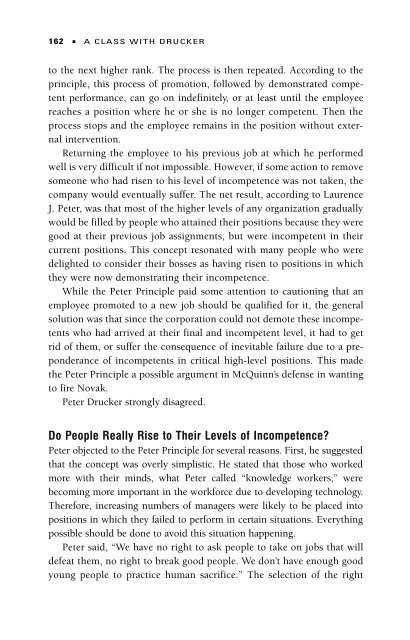A Class with Drucker - Headway | Work on yourself
A Class with Drucker - Headway | Work on yourself
A Class with Drucker - Headway | Work on yourself
You also want an ePaper? Increase the reach of your titles
YUMPU automatically turns print PDFs into web optimized ePapers that Google loves.
162 ■ A CLASS WITH DRUCKER<br />
to the next higher rank. The process is then repeated. According to the<br />
principle, this process of promoti<strong>on</strong>, followed by dem<strong>on</strong>strated competent<br />
performance, can go <strong>on</strong> indefinitely, or at least until the employee<br />
reaches a positi<strong>on</strong> where he or she is no l<strong>on</strong>ger competent. Then the<br />
process stops and the employee remains in the positi<strong>on</strong> <str<strong>on</strong>g>with</str<strong>on</strong>g>out external<br />
interventi<strong>on</strong>.<br />
Returning the employee to his previous job at which he performed<br />
well is very difficult if not impossible. However, if some acti<strong>on</strong> to remove<br />
some<strong>on</strong>e who had risen to his level of incompetence was not taken, the<br />
company would eventually suffer. The net result, according to Laurence<br />
J. Peter, was that most of the higher levels of any organizati<strong>on</strong> gradually<br />
would be filled by people who attained their positi<strong>on</strong>s because they were<br />
good at their previous job assignments, but were incompetent in their<br />
current positi<strong>on</strong>s. This c<strong>on</strong>cept res<strong>on</strong>ated <str<strong>on</strong>g>with</str<strong>on</strong>g> many people who were<br />
delighted to c<strong>on</strong>sider their bosses as having risen to positi<strong>on</strong>s in which<br />
they were now dem<strong>on</strong>strating their incompetence.<br />
While the Peter Principle paid some attenti<strong>on</strong> to cauti<strong>on</strong>ing that an<br />
employee promoted to a new job should be qualified for it, the general<br />
soluti<strong>on</strong> was that since the corporati<strong>on</strong> could not demote these incompetents<br />
who had arrived at their final and incompetent level, it had to get<br />
rid of them, or suffer the c<strong>on</strong>sequence of inevitable failure due to a prep<strong>on</strong>derance<br />
of incompetents in critical high-level positi<strong>on</strong>s. This made<br />
the Peter Principle a possible argument in McQuinn’s defense in wanting<br />
to fire Novak.<br />
Peter <str<strong>on</strong>g>Drucker</str<strong>on</strong>g> str<strong>on</strong>gly disagreed.<br />
Do People Really Rise to Their Levels of Incompetence?<br />
Peter objected to the Peter Principle for several reas<strong>on</strong>s. First, he suggested<br />
that the c<strong>on</strong>cept was overly simplistic. He stated that those who worked<br />
more <str<strong>on</strong>g>with</str<strong>on</strong>g> their minds, what Peter called “knowledge workers,” were<br />
becoming more important in the workforce due to developing technology.<br />
Therefore, increasing numbers of managers were likely to be placed into<br />
positi<strong>on</strong>s in which they failed to perform in certain situati<strong>on</strong>s. Everything<br />
possible should be d<strong>on</strong>e to avoid this situati<strong>on</strong> happening.<br />
Peter said, “We have no right to ask people to take <strong>on</strong> jobs that will<br />
defeat them, no right to break good people. We d<strong>on</strong>’t have enough good<br />
young people to practice human sacrifice.” The selecti<strong>on</strong> of the right


